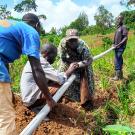This poster was presented by Kate Scow, of UC Davis, and Catherine Wandera, of Busitema University in Uganda, during the Horticulture Innovation Lab's 2015 annual meeting.
The poster introduces the Horticulture Innovation Lab project "Developing farmer-led irrigation solutions in Uganda" including updates on its progress. The overview and updates on the project include the objectives, approach, results of a needs assessment, and next steps for the project. Excerpts from the poster:
Introduction
- Spin-off project from project on participatory extension development for production and marketing of indigenous leafy greens in central Uganda.
- Technologies & opportunities for dry-season production identified by farmers as a major need for successful and profitable vegetable production.
- Women's participation in design and development process is key for improving access and uptake of technologies suitable for smallholder farming systems in East Africa.
Project objectives:
Objective 1. Develop innovations in small-scale irrigation and soil-water management technologies fitting the needs of smallholder fruit and vegetable growers in East Africa through a participatory process
Objective 2. Evaluate agronomic, economic, market, nutrition, and gender implications of innovations through participatory, multi-stakeholder performance assessments.
Objective 3. Develop protocols for integrating women into small-scale irrigation scheme design and planning
Objective 4. Strengthen capacity among farmers and local agricultural support organizations (research institutions, local government, NGOs, university faculty and students) to establish and improve sustainable small-scale irrigation schemes that lead to increased income and health for farmers.
Approach
- Identify "Innovation Sites" of existing smallholder irrigation expertise
- Establish committees to channel knowledge of the irrigation communities at innovation sites to project team expertise
- Design technology / management approaches and innovations in collaboration with farmer committees
- Develop region-specific evaluation parameters for smallholders in East Africa and gender-specific ways to improve access to irrigation / water management
- Conduct agronomic, economic, and social evaluations of different innovations with farmer committees focusing on women's access and use of improved water management systems
- Develop a practitioners' toolkit for establishing and upgrading small scale irrigation systems at a local scale (rather than large-scale scheme irrigation)
- Train farmers' and students' to improve local capacity to innovate in small scale irrigation and water management

